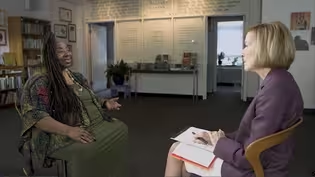
GOP and Democratic strategists on Trump's Epstein connection
Clip: 7/23/2025 | 7m 55sVideo has Closed Captions
GOP and Democratic strategists analyze renewed focus on Trump's connection with Epstein
President Trump marked his sixth month in office this week, touting his policy agenda and transformation of the federal government. But he also faces a public skeptical of his biggest accomplishments and a growing focus on his relationship with Jeffrey Epstein. Amna Nawaz discussed more with Democratic strategist Faiz Shakir and Republican strategist Kevin Madden.
Problems playing video? | Closed Captioning Feedback
Problems playing video? | Closed Captioning Feedback
Major corporate funding for the PBS News Hour is provided by BDO, BNSF, Consumer Cellular, American Cruise Lines, and Raymond James. Funding for the PBS NewsHour Weekend is provided by...

GOP and Democratic strategists on Trump's Epstein connection
Clip: 7/23/2025 | 7m 55sVideo has Closed Captions
President Trump marked his sixth month in office this week, touting his policy agenda and transformation of the federal government. But he also faces a public skeptical of his biggest accomplishments and a growing focus on his relationship with Jeffrey Epstein. Amna Nawaz discussed more with Democratic strategist Faiz Shakir and Republican strategist Kevin Madden.
Problems playing video? | Closed Captioning Feedback
How to Watch PBS News Hour
PBS News Hour is available to stream on pbs.org and the free PBS App, available on iPhone, Apple TV, Android TV, Android smartphones, Amazon Fire TV, Amazon Fire Tablet, Roku, Samsung Smart TV, and Vizio.
Providing Support for PBS.org
Learn Moreabout PBS online sponsorshipAMNA NAWAZ: Well, President Trump is marking his sixth month in office this week, touting his policy agenda and transformation of the federal government.
But he faces a public skeptical of his biggest accomplishments and a growing focus on his relationship with Jeffrey Epstein.
For more, I'm joined now by two of our regular contributors.
That's Democratic strategist Faiz Shakir and Republican strategist Kevin Madden.
So great to have you both together here at the table again.
Kevin, let's start with this Epstein issue.
Obviously, this is not leaving the president any time soon.
You saw the headlines today.
You now how Republicans on the House Oversight Committee subpoenaing Ghislaine Maxwell to come be deposed, a subcommittee going after more files.
On top of that, there are reports that Attorney General Pam Bondi told Mr. Trump in May his name is among those in the Epstein files.
Is it surprising you how sticky this issue is?
And how potentially damaging is it?
KEVIN MADDEN, Republican Strategist: It's not.
But I will say, like a lot of Americans, I have actually made a real effort, a concerted effort and strived to avoid reading about Jeffrey Epstein and try not to watch anything about it.
And I simply cannot.
It's the omnipresence of this story, whether it's mainstream media, conservative media, liberal media, you name it., It's just out there.
And I think that omnipresence is what is creating the great distraction.
I think even a lot of the president's critics would say that in the first six months he's had a very clear agenda for what he wanted to do on everything like immigration, taxes, DOGE, and he's achieved a lot of it.
And a lot of that, a lot of those achievements have been because he's been working very well with Republicans up on Capitol Hill.
Now a lot of that is put at risk because it's a distraction and because it's starting to create this tension not only for the president inside the White House, but with his allies up on Capitol Hill.
And I think that's the real peril for him going forward.
AMNA NAWAZ: Faiz, after months, I think it's fair to say, of Democrats are kind of struggling to get around one cohesive message, House Democrats are really leaning into this issue right now.
Is that the right move for them?
FAIZ SHAKIR, Democratic Strategist: Yes, of course.
I mean, Trump wound this up, first off.
I mean, it wouldn't really be an issue if not he had campaigned on and talked about it, talked about the release, then, of course, most famously brought right-wing influencers into the White House, 15 of them, gave them white binders.
They walked out of the White House and it said on the front cover of that binder "The Epstein Files Phase One."
They were urging their allies to talk about this issue and winding them up.
And now, of course, many of those people feel like they have been played for suckers.
And the reason why I think that it's sticking so much is that much of the American public is losing a sense of -- a sense of integrity and government officials.
And some of that narrative, I think that behooves Democrats at this point is, well, you did Medicaid cuts, you did tax cuts for the rich, you did some tariffs, you did all these things on DOGE, all these things you're doing, what's the narrative?
What's the framework by which we should think about what you're doing?
And Epstein provides it, a sense that, when it's wealthy and well-connected people, we go to the mat to protect them.
And when it's not, oh, we go to war against them.
And I think Epstein is going to help feed this narrative, help it make it clear to a lot of people who Donald Trump fights for most aggressively.
It happens to be people like Jeffrey Epstein.
AMNA NAWAZ: When you take a step back now, we're six months in to Mr. Trump's second term here.
The things he wants to be talking about, Kevin, to your point, are the points you have said he was -- the core issues he was elected on, right, immigration and the economy.
He's underwater on both.
And when you look at recent polling from CBS, he's got 56 percent disapproval on immigration, 70 percent of those polled saying that President Trump is not focused enough on lowering prices.
This is where I remind you after the election last year you said President Trump and Republicans had a lot of political capital coming into office.
KEVIN MADDEN: Yes.
AMNA NAWAZ: Have they mishandled that?
KEVIN MADDEN: Well, look, I think the other thing I predicted back then was, given the political volatility of the environment right now, that no matter who's going to be elected president was going to be underwater and face a very partisan Congress.
So I think that that's -- that was going to - - sort of baked into the cake.
But, look, in politics, one of the most valuable commodities you have is time.
And right now the president's had a very good streak over the last six months.
But now, with these distractions, is it creating -- is it going to take away some time where he needs to focus on the top issues?
The president and the Senate and the House of Republican allies, they have to go out there and sell the merits of the One Big Beautiful Bill.
They have to sell the merits of what they're going to do on things like housing, prices, inflation, right?
And so those type of distractions right now, that's the biggest challenge that they have is, how do they get -- how do they work to value that commodity of time and use it more efficiently?
And that's one of the big challenges that they have.
AMNA NAWAZ: Is it a messaging thing or is it that people aren't seeing it impact their everyday lives?
They haven't seen prices come down yet KEVIN MADDEN: Well, I think that's it.
I think well inside the polls you can see some good things.
The intensity that the president has with his own supporters, that's a very good thing.
But I think we talked about this all of during the campaign all during 2024.
The big middle of the American electorate is still where you make or break political majorities that are going to help you in the Congress and where they're going to help you get that - - keep and manage that political capital.
The most troubling part of the polls was that the president has sort of shed his support with independents.
AMNA NAWAZ: Yes.
KEVIN MADDEN: And I think that's what he has to get back by talking about the issues that those voters care about.
AMNA NAWAZ: Faiz, meanwhile, Democrats have faced their own frustration from their base and arguing they're not doing enough to fight President Trump's agenda.
You said after the election the party brand is suffering, it needs repair.
Are you seeing that repair work being done?
FAIZ SHAKIR: Not yet.
And there's a reason for it.
There's a tension within the party right now, unfortunately.
There are some who say we should play dead.
We should not say or do anything.
We should let the Republicans dig their own grave.
They're not dumb people.
These are intelligent people making an argument that Democrats should just lay low.
And the problem there is that you could potentially win a midterm election off of that.
You can beat the other party and gain seats because they want to -- voters want to deliver a verdict.
Particularly motivated voters in the midterms want to say, hey, we want to get off this Trump train and move to a more rational sense.
But for those who care about the Democratic Party, how are you defining it?
How are you making that an appealing vehicle that people want to support?
Right now, if I had to ask you, Amna, what are the main things that Democratic majorities want to do if they were governing, you can answer it.
Not many people could answer it.
But this same time in 2005, George Bush was president.
Democrats said, we're going to come up with an agenda, six for '06.
Here's six things we're going to do.
One of them happened to be the minimum wage.
They wanted to raise the minimum wage.
That was the last time, Amna, that we raised the minimum wage, was when Democratic majorities came in, worked with President Bush.
My point is right now is the time for Democrats.
If they want to repair the brand, be for something.
Come up with an agenda.
Say this is what we will do if we're in office.
AMNA NAWAZ: You're saying, going into the midterms, being the anti-Trump party isn't going to be enough?
FAIZ SHAKIR: Not enough, not to repair a brand of definition, what is it that you stand for?
That's what the Democratic Party needs to repair right now.
AMNA NAWAZ: Kevin, meanwhile, I have heard over and over this idea of a distraction for the Republicans, right, that they are not talking about the things that they want to be talking about.
How do they change the narrative over the months ahead?
KEVIN MADDEN: Do exactly what -- I mean, I think the counterpoint will be, which one of these parties does a better job of talking to the voters that really matter the most in this election?
Donald Trump and Republicans won because we have inherited and done a good job with working-class voters now.
They have migrated over to the Republican Party, largely because of some culture issues, also because some of economic issues.
It's those economic issues that are going to be the salvation for winning in November of this year.
So how are you talking about bringing down prices, creating jobs, housing, childcare, health care, energy prices?
That's going to be the core -- those are going to be the core issues that decide the midterms next year.
AMNA NAWAZ: It comes back to the economy again and again and again.
KEVIN MADDEN: Always, always, always.
AMNA NAWAZ: Kevin Madden, Faiz Shakir, great to see you both.
Thank you.
KEVIN MADDEN: Great being with you.
FAIZ SHAKIR: Appreciate it.
Gabbard sows doubt on Russia probe as Trump faces pressure
Video has Closed Captions
Clip: 7/23/2025 | 5m 36s | Gabbard pushes report on Obama and Russia probe as Trump faces pressure over Epstein (5m 36s)
Iran will continue uranium enrichment despite U.S. strikes
Video has Closed Captions
Clip: 7/23/2025 | 1m 30s | Iran says it will continue uranium enrichment despite U.S. strikes on nuclear facilities (1m 30s)
Loretta Ross explores a new way to face disagreements
Video has Closed Captions
Clip: 7/23/2025 | 8m 8s | 'Tell me more': Activist Loretta Ross explores a new way to face disagreements (8m 8s)
National parks struggle with funding and staffing cuts
Video has Closed Captions
Clip: 7/23/2025 | 8m 51s | How the National Parks Service is struggling with drastic funding and staffing cuts (8m 51s)
News Wrap: Aid groups warn of starvation and death in Gaza
Video has Closed Captions
Clip: 7/23/2025 | 7m 38s | News Wrap: Aid groups warn of 'chaos, starvation and death' in Gaza (7m 38s)
What's in Trump's new AI policy and why it matters
Video has Closed Captions
Clip: 7/23/2025 | 6m 37s | What's in Trump's new AI policy and why it matters (6m 37s)
What the new trade deal with Japan means for the U.S.
Video has Closed Captions
Clip: 7/23/2025 | 6m 30s | What the new trade deal with Japan means for U.S. businesses and consumers (6m 30s)
Providing Support for PBS.org
Learn Moreabout PBS online sponsorshipSupport for PBS provided by:
Major corporate funding for the PBS News Hour is provided by BDO, BNSF, Consumer Cellular, American Cruise Lines, and Raymond James. Funding for the PBS NewsHour Weekend is provided by...


















